|
Genres, Themes, Actors, and Directors:
- Bela Lugosi Films
- Black Comedy
- Boris Karloff Films
- Cat-and-Mouse
- Edgar G. Ulmer Films
- Newlyweds
- Horror
- Old Dark House
- Revenge
- Satanists
Response to Peary’s Review:
As Peary notes, this “high-camp horror film” — based in name only on Edgar Allan Poe’s short story — features a “delightfully preposterous storyline”, “witty dialogue, fine performances, amusing characters, bizarre sets, inventive direction, and some of the most peculiar scenes in horror-movie history.”
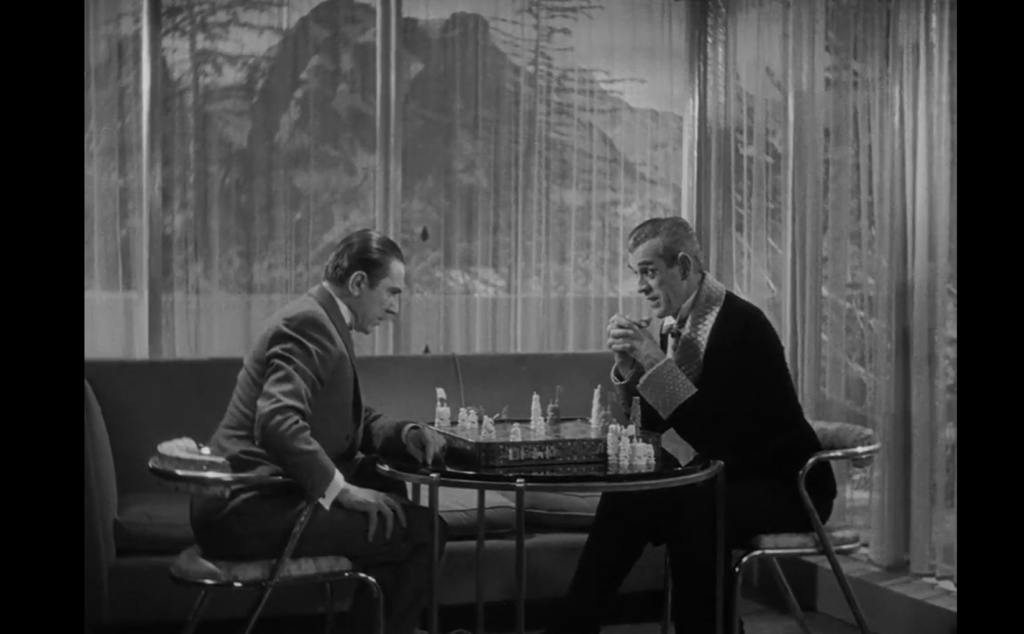
At only 65 minutes long, the story moves quickly, yet is often incoherent — most likely as a result of Universal Studios cutting the film drastically. Nonetheless, the film is so oddly conceived and visually compelling that it’s hard not to watch even when you’re not quite sure what’s going on.
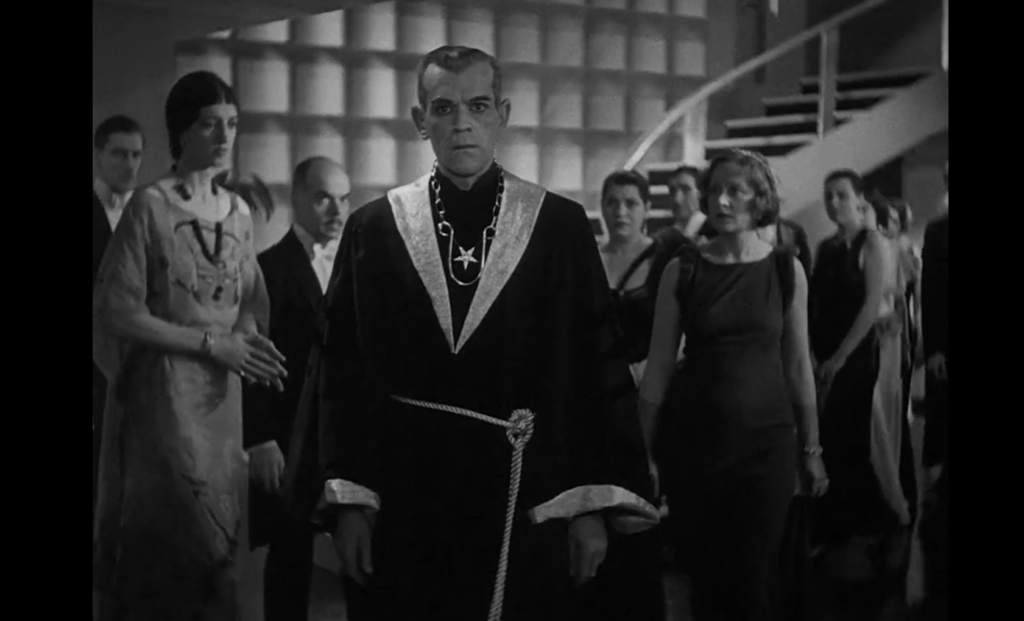
While reviewers at the time of its release were dismissive, today The Black Cat is regarded as pulp director Edgar Ulmer’s masterpiece — and for all its fans (though I’ll admit I’m not one of them), it remains “morbid, tasteless, and lots of fun.”
Redeeming Qualities and Moments:
- Bela Lugosi — in what is considered by many to be his finest role — as Dr. Vitus Werdegast
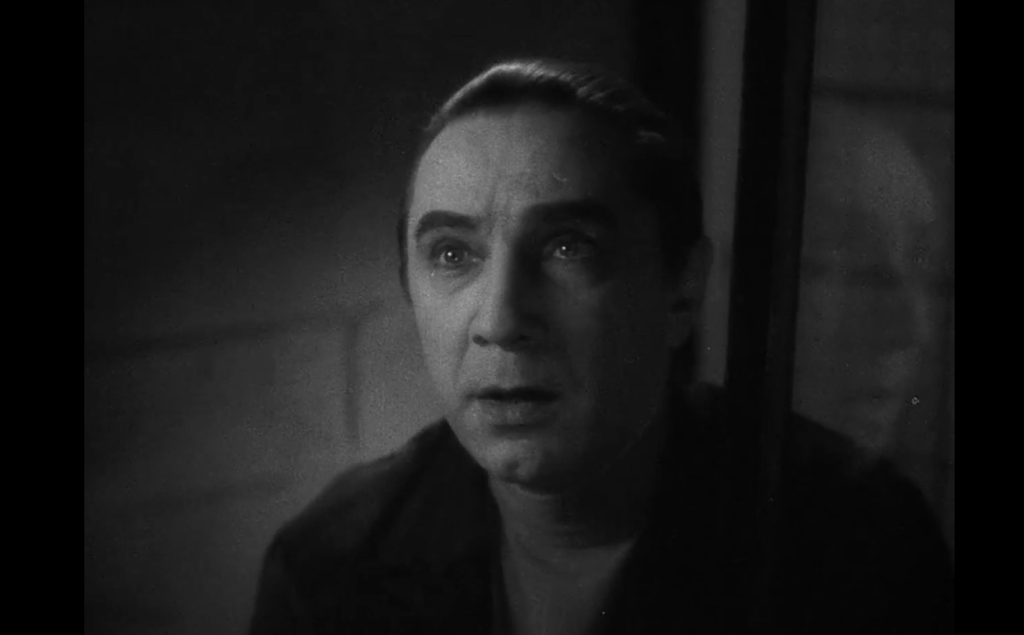
- Boris Karloff’s firmly tongue-in-cheek performance as the lisping, strangely coiffed Hjalmar Poelzig (modeled after famed Satanist Aleister Crowley)
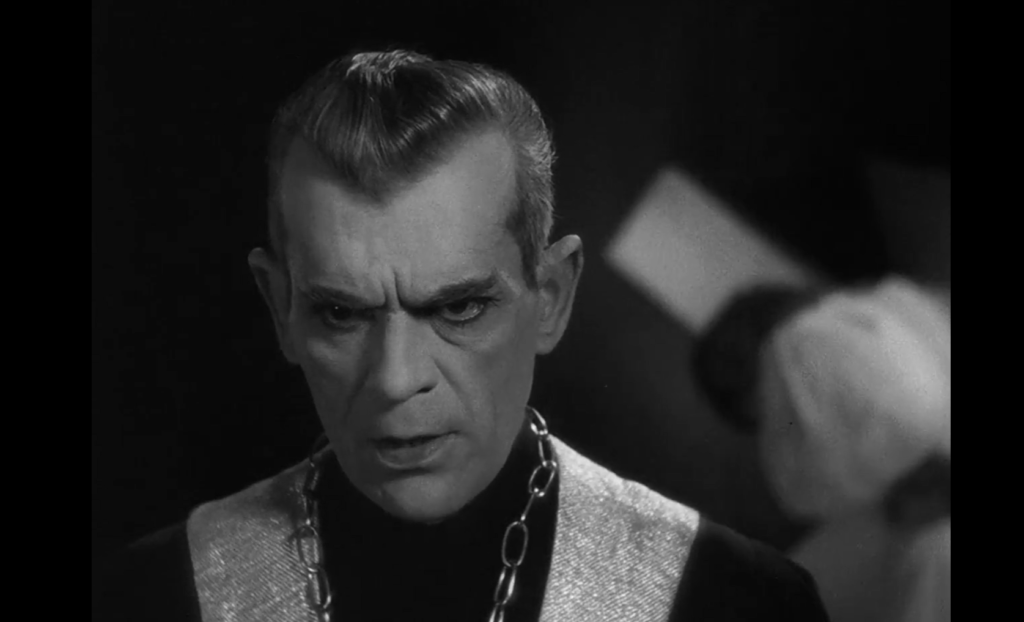
- Spooky, atmospheric cinematography
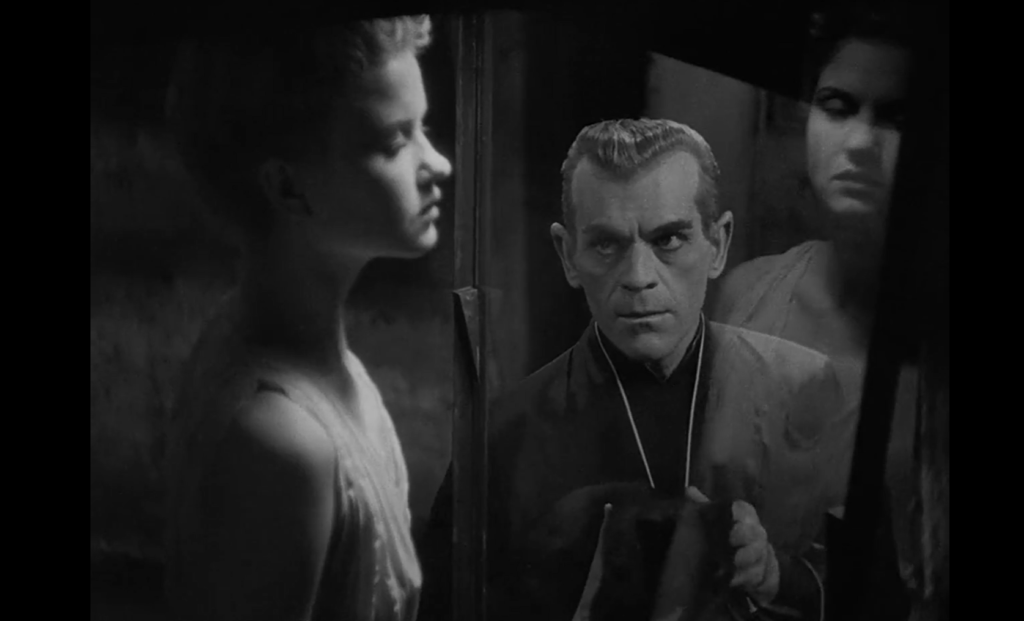
- Truly baroque set designs
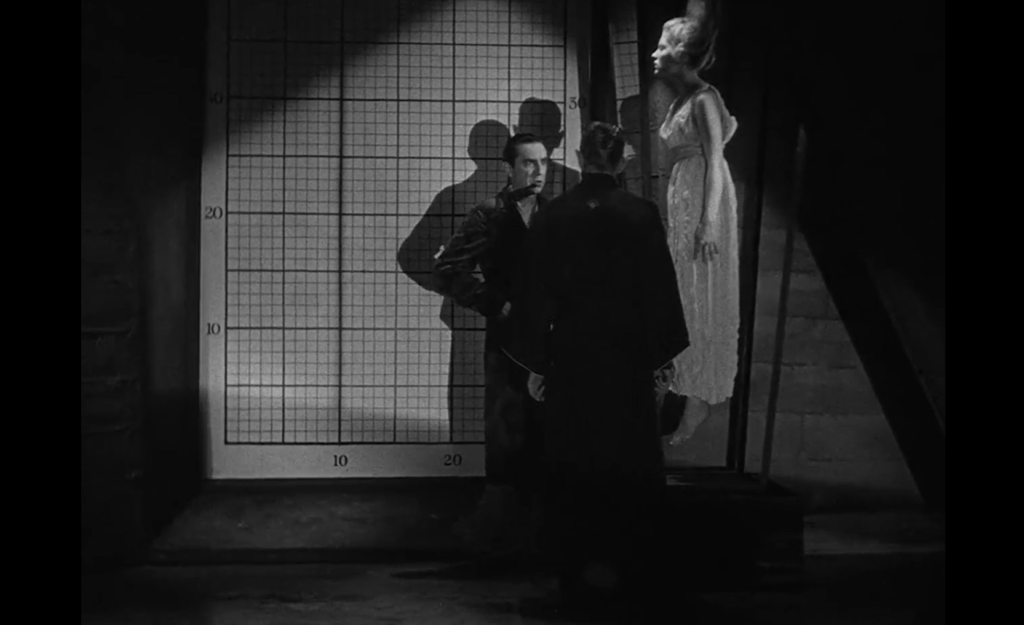
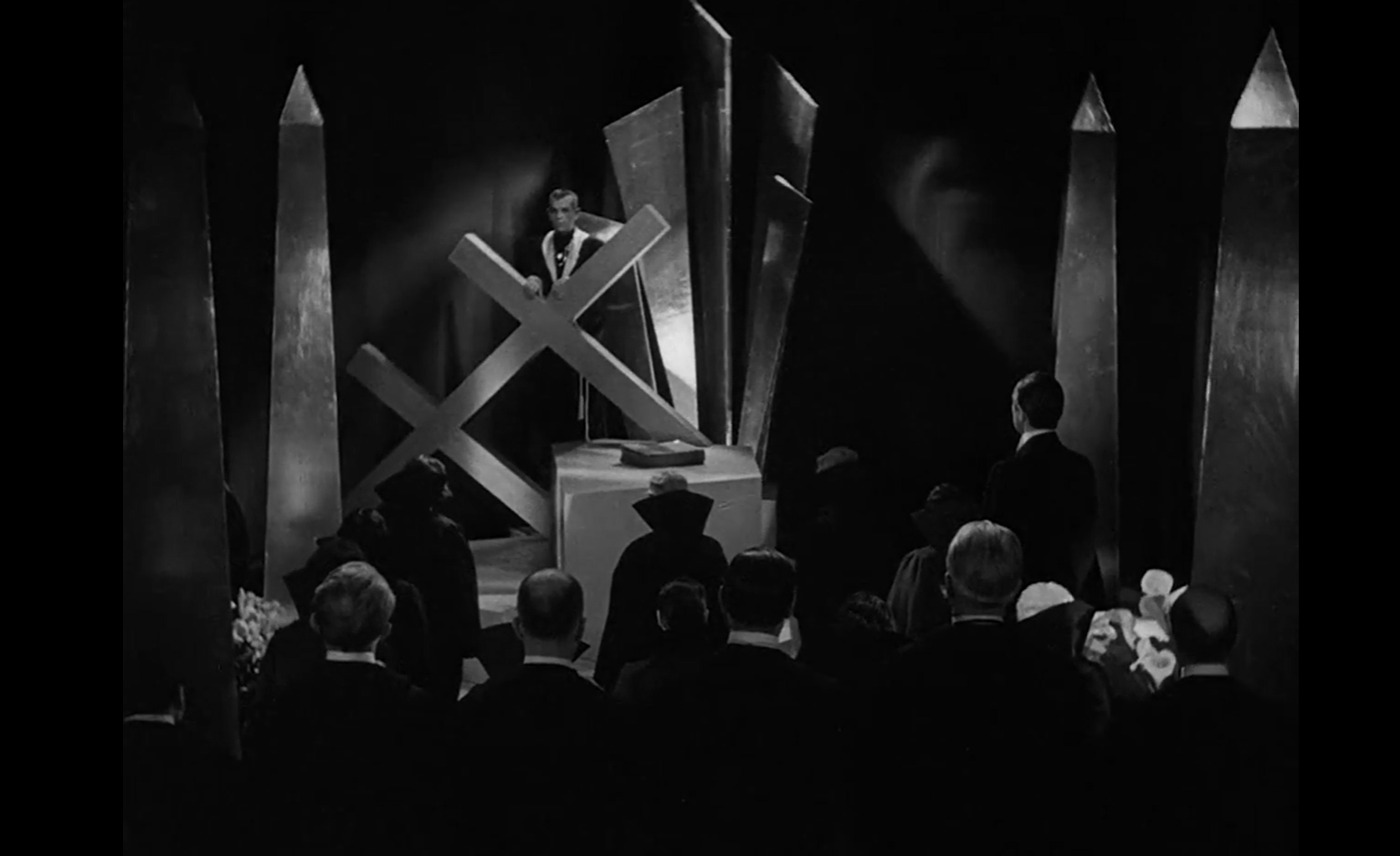
- Effective use of classical music in the score
Must See?
Yes. This odd cult film remains B-level director Edgar Ulmer’s finest achievement. Discussed at length in Peary’s Cult Movies 3 (1988).
Categories
- Cult Movie
- Important Director
(Listed in 1001 Movies You Must See Before You Die)
Links:
|
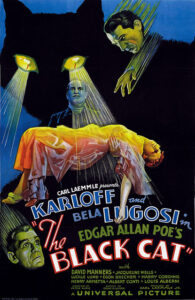







One thought on “Black Cat, The (1934)”
Very much a must – a unique film, probably Ulmer’s best. It has a timeless feel to it which prevents it from seeming dated, and it lends itself well to repeat viewings.
Peary is rather accurate in several of the things the assessment quotes him on. But he is wrong to call it “high-camp”. I’m guessing that, at the time he was compiling his FF Guide, he had not read Susan Sontag’s 1964 essay “Notes on ‘Camp'”. That breakthrough piece, though not the last word on the subject, certainly lays out many of the first words – the basics – clearly. Camp is either very conscious (like ‘Vegas in Space’) or unconscious/naive (like ‘Mommie Dearest’). The nature of camp is, to a degree, fluid, and there can certainly be elements of camp in a film which is not completely camp. But ‘The Black Cat’ is too aware of its serious nature as a horror film to qualify even for that.
The film doesn’t seem incoherent to me, even if a few minor areas would benefit from a little more detail. But things do move quickly and we’re left to tie a few things together ourselves since, as an audience, we’re mainly working with major brushstrokes.
It’s funny that I should rewatch this now. I had just seen something on YouTube called ‘Hollywood’s War On God’, something of a diatribe which, as it went on, seemed to be more and more of an agenda piece from the Christian Right. Even so, there were interesting bits of information in it – mainly regarding the depiction of Satanism in (mainly contemporary) film. Aleister Crowley’s influence looms large in the piece – and it is spooky how the same overt references do appear in various films (and much more often these days). No mention is made of ‘The Black Cat’ (the piece is mainly a warning about current trends in cinema) but watching ‘TBC’ again made me think of the fact that it was way ahead of its time (perhaps another reason it seems fresh).
What perhaps stands out from the many arresting aspects of ‘TBC’ – its whole look being primary among them – is the dynamic between Karloff and Lugosi, which is particularly strong. (It brings to mind the rancorous remarks Martin Landau makes as Lugosi in Burton’s ‘Ed Wood’.)
As well: Frankenstein aside, has Karloff ever looked this fierce? (I did giggle when Lugosi remarks on how ‘well’ Karloff looks.) And isn’t it refreshing seeing Lugosi be this sympathetic? Karloff has the more clearly defined role, however. Even if the film suffers from editing (and it probably does, some), the writers – Ulmer among them – ended up giving Lugosi some difficult hurdles. (For dramatic effect, we get the following, but: would he really kill a cat in front of witnesses, esp. if it were a pet? – and why do they not really react?; as compassionate as he is, would he be willing to gamble with people’s lives via a chess game?; why does he seem suddenly passive when Karloff puts the couple in immediate danger?) Lugosi is really great in this movie but he never was great at subtext, so he does have some trouble overcoming some of what the writers saddled him with.
I could probably go on and on about this particular film. But suffice it to say, it’s rich for quite a few reasons.